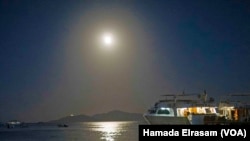Egypt’s tourism industry suffered another blow on Friday, when Russia said it would ban all EgyptAir flights to Moscow as of Saturday.
Britain, Russia and several other countries had already cancelled all direct flights to Sharm el-Sheikh, saying the crash two weeks ago that killed all 224 people on board was most likely caused by a bomb onboard.
At a restaurant in a Cairo suburb, Osama el-Sayed washed vegetables to make the traditional bean dish, ful, for his customers’ breakfast.
The crash alone was enough to damage Egypt’s economy, he said, but the flight cancellations are the death knell. Russian and British tourists make up the bulk of visitors to Sharm el-Sheikh, Egypt’s premier resort town.
"Tourism in Egypt is already down," he said. "For sure, 100 percent, it will destroy the industry."
The investigation into the crash remains a mystery to many Egyptians, with little information available, Sayed added. Militants claiming links to the Islamic State group say they carried out the attack, but the Egyptian government says the investigation has so far been inconclusive.
On Wednesday, Egyptian President Abdel-Fattah el-Sissi visited Sharm el-Sheikh, saying "Egypt is safe," and urging the international community to inspect the airport.
Resistance creates suspicion
The Egyptian government’s reluctance to recognize that the crash could have been a terrorist attack makes the government appear to have an agenda other than simply uncovering the truth in its investigation, said Daniel Wagner, who heads U.S.-based security consulting firm Country Risk Solutions.
"If everybody in the world thinks it’s one thing, and they’re saying, ‘Well, I don’t think that’s the thing,’ whatever credibility they have, they’re just losing," he said.
In the coming days, the wreckage from the airplane is expected to be transported to Cairo. The plane’s black box recordings are being sent to an unnamed country to be inspected. Last Saturday, Civil Aviation Minister Hossam Kamal said a “noise” could be heard at the end of a recording, without speculating about what could have caused the sound.
Regardless of what caused the crash, the impact on Egypt’s tourism industry has been devastating. Egypt says the country stands to lose $280 million a month as long as visitors stay away from country's beaches and historic sites.
On the streets of Cairo, some people are angry. The tourism industry employs roughly one in 10 people in Egypt and makes up a large portion of the country’s foreign currency income.
"We need tourism," said Islam Rayan, a soldier walking down a residential street on Friday. Even if it was a terrorist attack, he said, the Egyptian government is capable of securing the airports after the security breach.
"Our country runs on tourism," he said. "If it's not operating, what will the people eat? Each other?"
VOA correspondent Hamada Elrasam contributed to this report from Cairo.






